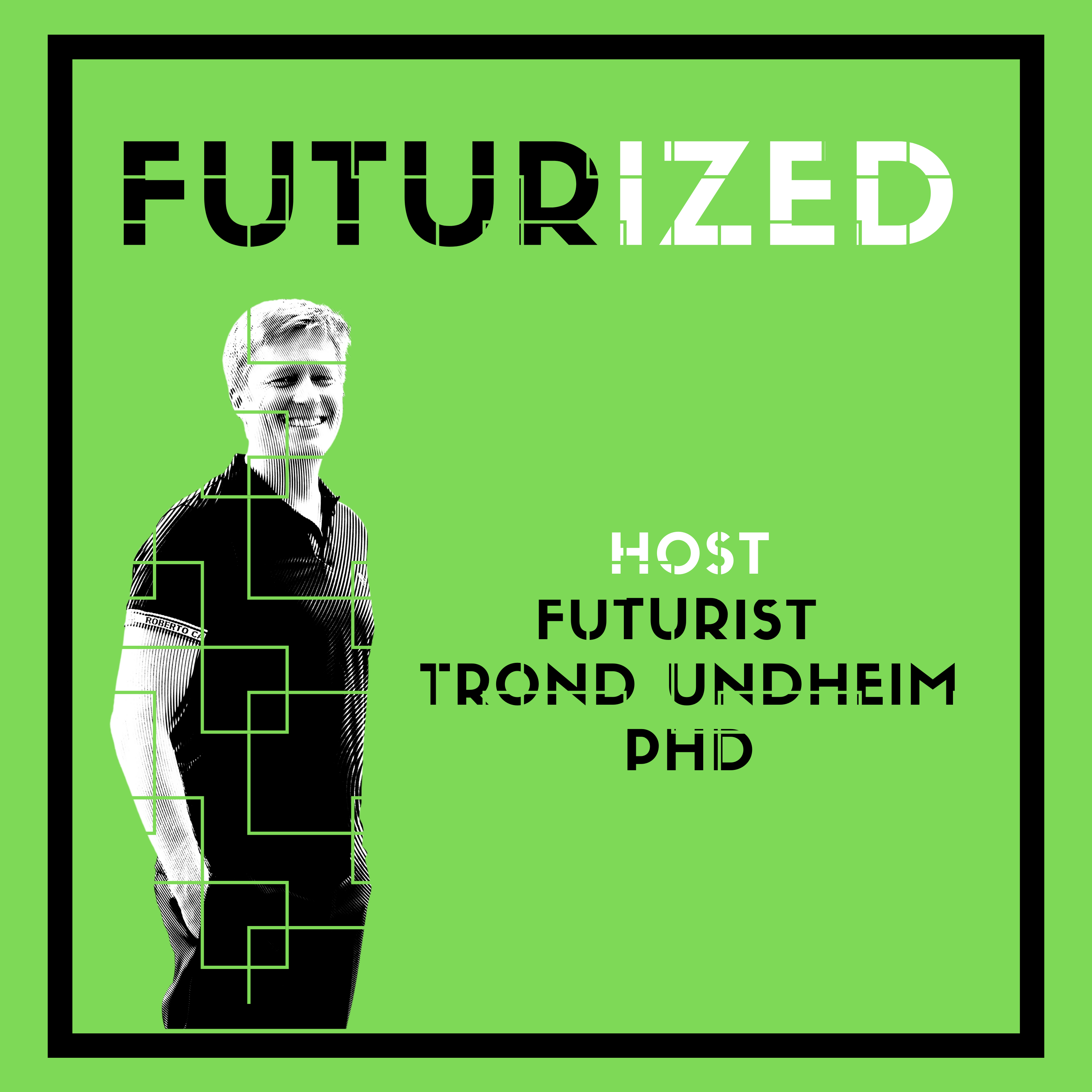
295.5K
Downloads
193
Episodes
The Futurized podcast goes beneath the trends, tracking the underlying forces of disruption in tech, policy, business models, social dynamics, and the environment. Futurist Trond Arne Undheim, PhD, author, investor, and serial entrepreneur, interviews smart people with a soul. Every week, founders, authors, executives and other thought leaders come on the show to discuss the societal impact of deep tech (e.g. AI, blockchain, IoT, CRISPR, nanotech, 3D printing, quantum, robotics) and the emerging future of work, markets, business and society.
The Futurized podcast goes beneath the trends, tracking the underlying forces of disruption in tech, policy, business models, social dynamics, and the environment. Futurist Trond Arne Undheim, PhD, author, investor, and serial entrepreneur, interviews smart people with a soul. Every week, founders, authors, executives and other thought leaders come on the show to discuss the societal impact of deep tech (e.g. AI, blockchain, IoT, CRISPR, nanotech, 3D printing, quantum, robotics) and the emerging future of work, markets, business and society.
Episodes
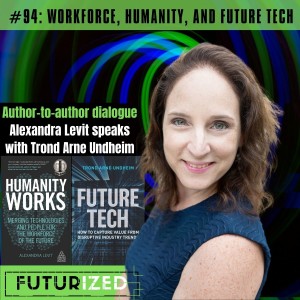
Tuesday Apr 20, 2021
Workforce, Humanity, and Future Tech
Tuesday Apr 20, 2021
Tuesday Apr 20, 2021
Alexandra Levit, 8x author, speaker, and career expert, interviewed by Trond Undheim, futurist and author.
In this conversation, we talk about the future of careers and strategic HR. We discuss a recent book by Levit: Humanity Works: merging tech and people for the workforce of the future (2019). Alexandra and I agree that there is lots of work required to integrate tech in the workforce. Paradoxically, it requires hard, human work to adapt to new realities. We then discuss a brand new book penned by myself, Trond Undheim: Future Tech: how to capture value from disruptive industry trends--a framework for understanding tech/society (2021). We talk about the trends of co-working, remote work, portfolio careers, gig economy, design thinking, workplace culture, experience retail, applied tech skills, the importance of training. We also discuss the future and what that entails for the workforce and for how technology will evolve.
Having listened to this episode, check out Humanity Works, Future Tech as well as Alexandra Levit and Trond Undheim's online profiles:
- Humanity Works: https://www.amazon.com/Humanity-Works-Merging-Technologies-Workforce/dp/0749483458
- Future Tech: https://www.amazon.com/Future-Tech-Capture-Disruptive-Industry/dp/1398600326
- Alexandra Levit (LinkedIn, Twitter: @alevit): https://www.alexandralevit.com/
- Trond Undheim (LinkedIn, Twitter @trondau): https://trondundheim.com/
My takeaway is that paradoxically, the future of technology is not so much about tech as it is about getting the human part right. We need to train, retrain, and adapt. We will spend more time doing that than actually developing new technology. Also, successful technology requires being in close touch with its prospective users. Failing that, technology fails. The Future of work can be bright for young people if they are proactively explore the opportunities in front of them. Conversely, the world we have already entered rewards creativity and initiative. Without that, any trend, technology or otherwise, will come as an unpleasant surprise.
Thanks for listening. If you liked the show, subscribe at Futurized.org or in your preferred podcast player, and rate us with five stars.
If you like this topic, you may enjoy other episodes of Futurized, such as episode 49, Living the Future of Work, episode 41, The Future of Work, or episode 71, Future Tech - a preview. Keep in mind that so far, there are over 20 episodes of Futurized that tackle the Future of Work, so you may wish to browse more episode using the categories and search function provided on the Futurized.org website.
Futurized—preparing YOU to deal with disruption.
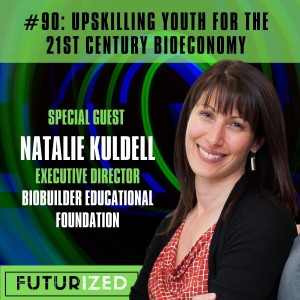
Tuesday Apr 13, 2021
Upskilling Youth for the 21st Century Bioeconomy
Tuesday Apr 13, 2021
Tuesday Apr 13, 2021
Natalie Kuldell, Executive Director & founder, BioBuilder Educational Foundation, interviewed by Trond Arne Undheim, futurist, investor, and author.
In this conversation, we talk about synthetic biology for all, bringing engineering into life science and about deep science in classrooms. We discuss disruptive forces (tech, regulation, business models, social dynamics). We discuss skills shortage initiatives, biomanufacturing jobs, business models, exciting startups such as Ginkgo Bioworks and Asimov. She explains Biobuilder.org's pivot to online during COVID-19, scaling the efforts to the rust belt, community science, and community labs such as Genspace, BosLabs, BioCurious, Biogen Community Lab, Bricobio, and (iGEM) Foundation Jamboree. Finally, we discuss next decade's self-taught scientists and agri-bio revolution in rust belt farming communities.
Having listened to this episode, check out BioBuilder Educational Foundation as well as Natalie Kuldell's online profile:
- BioBuilder Educational Foundation (@SystemsSally):
- Natalie Kuldell: https://www.linkedin.com/in/natalie-kuldell-9947408/
My takeaway is that synthetic biology must become a skillset of every young person. They need it to understand the world they will grow up in. It will increasingly become a life skill, perhaps even a survival skill depending on how the world goes. "Citizen science is more than looking at stars, and looking at birds", says Natalie. For sure. Deep science is cool and it needs to be cool for a while. That much is certain.
Thanks for listening. If you liked the show, subscribe at Futurized.org or in your preferred podcast player, and rate us with five stars. If you like this topic, you may enjoy other episodes of Futurized, such as episode 22 The Future of Engineering Education, episode 36, The Future of Cultured Meat, or episode 81, 2x Community Science -- Cancer Map and COVID-19 Testing in Schools.
Futurized—preparing YOU to deal with disruption.

Tuesday Apr 06, 2021
The Future of Vertical Farming
Tuesday Apr 06, 2021
Tuesday Apr 06, 2021
Eddy Badrina, CEO of Eden Green, interviewed by host Trond Arne Undheim, futurist, investor, and author.
In this conversation, we talk about whether indoor grown food is equally healthy? How has the space of vertical farming emerged? We discuss the demand for organic food, environmental concerns, soil quality depletion, groundwater depletion, and chemical pollution. Eddy explains the main distinctions and concepts, including Greenhouses, Hydroponics, Aeroponics, Aquaponic, Vertical farming, and the various growth vectors, such as greenhouse, shipping container, skyscraper, or warehouse. We discuss sensors, climate control, LED lighting. How do you define the vertical farming market? Who are the players? Which disruption forces are most actively influencing the field of vertical farming right now? How does he stay up to date? How does he recommend my listeners (and I) stay up to date? Looking at the next decade, I ask Eddy what he thinks will happen to vertical farming? We discuss high yield local food production in inner cities, near deserts, on islands, on in space and beyond
My takeaway is that vertical farming is poised for growth, and I don't just mean that as a pun. There are legitimate reasons why foodtech is exploding right now. Food and Ag coupled with tech is necessary, exciting, and is becoming scalable. Can the costs of vertical farming come down? Will we see vertical farms in every country and every municipality? Time will show.
Having listened to this episode, check out Eden Green as well as Eddy Badrina's online profile:
- Eden Green (@edengreentech): https://www.edengreen.com/
- Eddy Badrina (@eddybadrina): https://www.linkedin.com/in/eddybadrina
Thanks for listening. If you liked the show, subscribe at Futurized.org or in your preferred podcast player, and rate us with five stars.
If you like this topic, you may enjoy other episodes of Futurized, such as episode 87 Performance Food, episode 52 The Future of Peer-to-Peer, or episode 36 The Future of Cultured Meat.
Futurized—preparing YOU to deal with disruption.
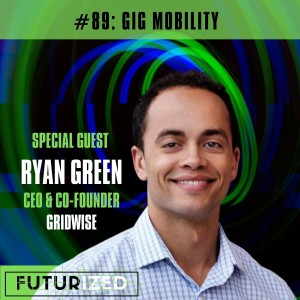
Tuesday Mar 30, 2021
Gig Mobility
Tuesday Mar 30, 2021
Tuesday Mar 30, 2021
Ryan Green, CEO & co-founder, Gridwise, interviewed by host Trond Arne Undheim, futurist, investor, and author.
In this conversation, we talk about whether gig mobility services (MaaS) become the standard for how to move in cities? What does the future of driver intelligence look like? We discuss the emerging market size and key verticals such as transportation, city government, real estate, and financial services. We cover disruptive forces and barriers such as COVID-19, security, data protection, and IP. I ask Ryan about the exciting startups he sees in the space and we discuss the next decade's autonomy, data sharing, and mobility-as-a-service adoption.
My takeaway is that gig mobility is becoming the standard for how to move in cities. We are moving into a period with a hybrid fleet of various degrees of human and autonomous driving enabled. The quest for data and the question of who owns it, will also hit transportation. Being a connector between different mobility services is an interesting space to be in, a role one would have expected national, regional and city governments to occupy, but now becoming a battleground for large mobility players as well as emerging startups. Are we at the cusp of the truly smart city? Just maybe but there's going to be dumb infrastructure challenges remining for some years to come.
Having listened to this episode, check out Gridwise as well as Ryan Green's online profile:
- Gridwise (@gridwise_io): http://www.gridwise.io/
- Ryan Green: https://www.linkedin.com/in/ryanagreen/
Thanks for listening. If you liked the show, subscribe at Futurized.org or in your preferred podcast player, and rate us with five stars. If you like this topic, you may enjoy other episodes of Futurized, such as episode 3, The Remaking of Transportation, episode 82, The Future of Grid Energy Innovation, or episode 16, The Future of Human Perception AI.
Futurized—preparing YOU to deal with disruption.
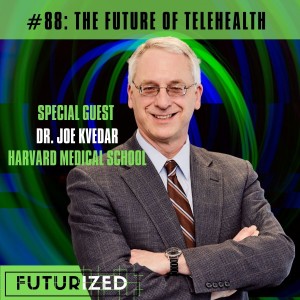
Tuesday Mar 23, 2021
The Future of Virtual Care
Tuesday Mar 23, 2021
Tuesday Mar 23, 2021
Dr. Joe Kvedar, Professor of Dermatology, Harvard Medical School, author, editor, advisor and telehealth evangelist, interviewed by Trond Arne Undheim, futurist, investor, and author.
In this conversation, we talk about the history Telehealth and it's transformation into a two-channel delivery system combining in-person and virtual care. A precursor in the field, Joe charts the 20 year evolution from "show me the data" to "how do I implement?". We briefly discuss the use case of Melanoma therapy and AI/imaging from Kvedar's own field, dermatology. We discuss COVID-19 effects and other disruptive forces. Joe shares the startups he sees disrupting the game and how he stays up to date. We cover the emerging two-channel care delivery system and discuss the future of virtual care in the next decade.
My takeaway is that Telehealth has come a long way in 20 years and it's not just about the technologies, but it is also about adapting to a hybrid model of care where you each time select the communication mode that best serves the patient given the constraints, and still is efficient for the health system at large. The future of virtual care is up for grabs, it is already starting to look different from five years ago. Leapfrogging seems entirely possible and we will see new winners but also old champions rise to the challenge having invested time and resources in the area for decades. What's certain is that both infrastructure and skills will need to evolve with the challenges and opportunities ahead.
Having listened to this episode, check out Harvard Medical School as well as Dr. Joe Kvedar's online profile:
- TEDx Talk: Why Humans are the Future of Digital Health | Joe Kvedar | TEDxBeaconStreet - YouTube
- Harvard Medical School (@harvardmed): https://hms.harvard.edu/
- Dr. Joe Kvedar (@jkvedar): https://www.linkedin.com/in/joekvedar/
- Homepage: https://www.joekvedar.com/
Thanks for listening. If you liked the show, subscribe at Futurized.co or in your preferred podcast player, and rate us with five stars.
If you like this topic, you may enjoy other episodes of Futurized, such as episode 19, Digital Health in Future Pandemics, episode 55 AI for Medicine, or episode 82 The Future of Digital Health AI.
Futurized—preparing YOU to deal with disruption.

Tuesday Mar 16, 2021
Performance Food
Tuesday Mar 16, 2021
Tuesday Mar 16, 2021
Luci Gabel, Nutritionist, Adjunct Professor at San Jose State University, and author of Eat to Lead, interviewed by host Trond Arne Undheim, futurist, investor, and author.
In this conversation, we talk about Luci's own path to healthy eating. We go through a brief history of diets, from low Fat, low Carb, Atkins, Veg, Organic, Low Sugar, and Keto. I ask Luci about best practices from her Eat To Lead book, we get into the Dynamic Lifestyle Roadmap and get the lowdown on Fruit, Carbs, Protein and Fat. We discuss microbiome awareness as well as her Five-Star restaurant secrets. Lastly, we hit on the emerging future of personalized wellness, longitudinal nutrition research, longevity, brain health, tech, and increased performance.
My takeaway is that performance food is not yet here but it will be. When it is, hopefully the lessons can be shared widely. For now, we have precursors like Luci, who are inviting each of us to be more mindful of what we eat and watch the results closely. Clearly, positive effects can be had, but we still don't fully understand the cause and effect. Nutrition is indeed a topic for the future. We should Eat to Lead, that's a great aspiration.
Having listened to this episode, check out Eat To Lead as well as Luci Gabel's online profile:
- Eat To Lead (book): https://www.eattolead.com
- Personal website: https://www.lucigabel.com
- LinkedIn: https://www.linkedin.com/in/lucigabel/
- Instagram: https://www.instagram.com/lucigabel/
- Facebook: https://www.facebook.com/EattoLead/
- Twitter: https://twitter.com/lgfit?lang=en
Thanks for listening. If you liked the show, subscribe at Futurized.org or in your preferred podcast player, and rate us with five stars. If you like this topic, you may enjoy other episodes of Futurized, such as episode 2 on The Future of Beverages, episode 36 Future of Cultured Meat, or episode 80 The Future of Personal Development.
Futurized—preparing YOU to deal with disruption.
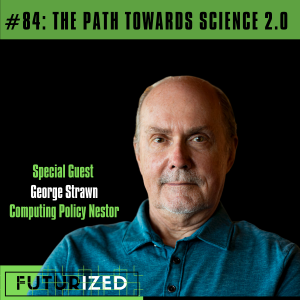
Tuesday Mar 09, 2021
The Origins and Future of Open Science
Tuesday Mar 09, 2021
Tuesday Mar 09, 2021
George Strawn, computing policy nestor, interviewed by, interviewed by host Trond Arne Undheim, futurist, investor, and author.
In this conversation, we talk about the Origins and Future of Open Science. We investigate the decisions that turned ARPAnet into the global internet and the first ISP via educational institutions. We discuss the rise and fall and rise again of the Office of Science and Technology Policy at the White House, the role of the National Academies in the US and abroad, the path towards open science with open access, preprint servers, and why big science publishers resist it. George muses on the role of science and data in the next decade.
My takeaway is that the origins of open science and the internet were a combination of savvy futuristic planning, and surprising twists and turns. The magnitude of the changes have been felt by all. The future of open science still looks open ended, but the promise of bottom-up self-regulation is more alluring than the alternative, a regulatory grab to avoid damaging lock-in effects. Data is the new business model, but the holders of big data become the arbiters of human destiny. Can we achieve George's vision of one computer, one dataset? The implications would be world-changing.
Having listened to this episode, check out National Academies as well as George Strawn's online profile:
- National Academies: https://www.nationalacademies.org/
- George Strawn: https://www.linkedin.com/in/george-strawn-8a1171/
Thanks for listening. If you liked the show, subscribe at Futurized.org or in your preferred podcast player, and rate us with five stars.
If you like this topic, you may enjoy other episodes of Futurized, such as episode 84 The path towards Science 2.0, episode 48, The Future of AI in government or episode 29 Future of Computational Media.
Futurized—preparing YOU to deal with disruption.
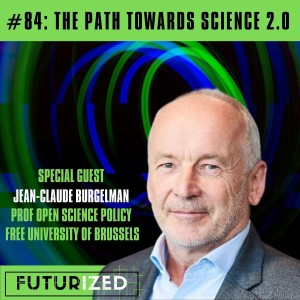
Wednesday Feb 24, 2021
The path towards Science 2.0
Wednesday Feb 24, 2021
Wednesday Feb 24, 2021
Jean-Claude Burgelman, Professor of Open Science Policy at the Free University of Brussels, interviewed by host Trond Arne Undheim.
In this conversation, they talk about The Impact of Digital on Science. JC Burgelman’s career spans the EU, foresight, Media, and tech assessment. We discuss the role of foresight in EU policy. What are the big challenges? Fallout of COVID has compelled science from closed to open, from premium to collaborative. Is a 5th revolution in science irreversible? What has been learned? We talk about how the business model is shifting from articles to data and touch on next decade’s science and publishing.
My takeaway is that data is the new oxygen and science is opening up. How quickly will it happen? Quicker than you would think. Yet, proprietary publishing models still have some gas in the tank and don't misunderstand that with open science everything will somehow be free. Scientific institutions, teams of scientists, and perhaps even individual scientists, will, rather, be able to price themselves more accurately. There might be a bigger discrepancy between good science and bad science, and perhaps less of the latter.
Having listened to this episode, check out Frontiers Policy Lab as well as Jean-Claude Burgelman's online profile:
- Frontiers Policy Lab: https://policylabs.frontiersin.org
- Jean-Claude Burgelman (@BurgelmanJean): https://www.linkedin.com/in/jean-claude-burgelman-528a7566/
The show is hosted by Podbean and can be found at Futurized.co. Additional context about the show, the topics, and our guests, including show notes and a full list of podcast players that syndicate the show can be found at https://trondundheim.com/podcast/. Music: Electricity by Ian Post from the album Magnetism.
For more about the host, including media coverage, books and more, see Trond Arne Undheim's personal website (https://trondundheim.com/) as well as the Yegii Insights blog (https://yegii.wpcomstaging.com/). Undheim has published two books this year, Pandemic Aftermath and Disruption Games. To advertise or become a guest on the show, contact the podcast host here.
If you like this topic, you may enjoy other episodes of Futurized, such as episode 22 The Future of Engineering Education, episode 51 on AI for learning, or episode 55 AI for Medicine.

Monday Feb 15, 2021
The Future of Digital Health AI
Monday Feb 15, 2021
Monday Feb 15, 2021
Catherine Havasi, CEO and co-founder, Dalang Health, interviewed by futurist Trond Arne Undheim.
In this conversation, they talk about Patient experience. Telehealth. Personalizing digital health. The AI space (ConceptNet, crowdsourcing for AI, word embeddings, transfer learning, multilingual natural language processing (NLP), and machine learning, federated learning). Chronic Disease Management. Exciting applications (health coaching, telehealth, mHealth, chatbots, agent assist, augmentation, scaling personalization, digital characters, animation, avatars). Perspectives on the future.
The takeaway is that Digital Health AI must emerge but only when we are sure the software truly works. For now, what we have is scattered machine learning applications that approximate meaning and compute fairly mindlessly. Hyperpersonalized health will indeed depend on AI, but the tech will only succeed if its developers realize that life is complex, people are different, and there was a reason healthcare has been somewhat tailored to each person in a manual fashion. Behavioral health apps are great, but need to be integrated into the health system in an interoperable manner before it can have its true effect on population health and individual health outcome.
Having listened to this episode, check out Dalang Health as well as Catherine Havasi's online profile:
- Catherine Havasi (@catherinehavasi) https://www.linkedin.com/in/havasi/
- Dalang Health (@dalangtech) https://www.dalanghealth.com/
- Homepage https://www.catherinehavasi.com/
The show is hosted by Podbean and can be found at Futurized.co. Additional context about the show, the topics, and our guests, including show notes and a full list of podcast players that syndicate the show can be found at https://trondundheim.com/podcast/. Music: Electricity by Ian Post from the album Magnetism.
For more about the host, including media coverage, books and more, see Trond Arne Undheim's personal website (https://trondundheim.com/) as well as the Yegii Insights blog (https://yegii.wpcomstaging.com/). Undheim has published two books this year, Pandemic Aftermath and Disruption Games. To advertise or become a guest on the show, contact the podcast host here.
Thanks for listening. If you liked the show, subscribe at Futurized.co or in your preferred podcast player, and rate us with five stars. If you like this topic, you may enjoy other episodes of Futurized, such as episode 55 AI for Medicine, episode 19 on on Digital Health in Future Pandemics, , episode 26 How to Write a book on the Future of Healthcare. Futurized—preparing YOU to deal with disruption.
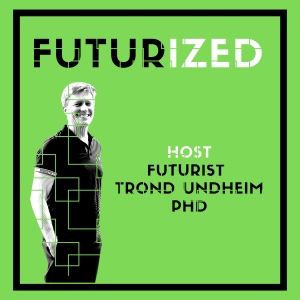
Wednesday Feb 10, 2021
Future tech as a disruptive force
Wednesday Feb 10, 2021
Wednesday Feb 10, 2021
In episode 86 of the podcast, the topic is: Future Tech: Disruptive technology forces. Futurist Trond Arne Undheim talks about Chapter 2 of his forthcoming book Future Tech: How to capture value from disruptive industry trends, which is about how science and technology enable innovation. We listen to some clips from earlier episodes of Futurized, in the domains of AI, engines, quantum computing and more.
After listening to this episode, check out the Future Tech book, which can be obtained in near any bookseller around the globe:
- Future Tech (author website): https://trondundheim.com/future-tech/
- Future Tech (Amazon.com): https://www.amazon.com/Future-Tech-Capture-Disruptive-Industry/dp/1398600326/
- Future Tech (Amazon.co.uk): https://www.amazon.co.uk/Future-Tech-Capture-Disruptive-Industry-ebook/dp/B08PQ1X6RJ/
- Future Tech (Publisher website): https://www.koganpage.com/product/future-tech-9781398600324
The show can be found at Futurized.co. Additional context about the show, the topics, and our guests, including show notes and a full list of podcast players that syndicate the show can be found at https://trondundheim.com/podcast/. Music: Electricity by Ian Post from the album Magnetism.
To advertise or become a guest on the show, contact the podcast host here.
If you like this topic, you may enjoy other episodes of Futurized, such as episode 51 which is on AI for Learning, episode 16 on Perception AI, episode 49 Living the Future of Work, or episode 71 Future Tech - a Preview.
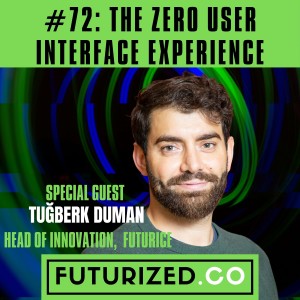
Tuesday Feb 09, 2021
The Zero User Interface Experience
Tuesday Feb 09, 2021
Tuesday Feb 09, 2021
Tuğberk Duman, Head of Innovation at Futurice, the Finnish consultancy, interviewed by futurist Trond Arne Undheim.
In this conversation, they talk about Why thinking about a world beyond the screen? Invisible user interface where natural gestures (body movements, perhaps even thoughts) trigger interactions. Current examples making use of Alexa, Google Home, Siri, Cortana, or Google Glass). Experiments, Trends in UI design, Design thinking inspiration and components (chatbots, biometrics, computer vision, new ecosystem business models). Emerging use cases. Surprising industries are first adopters. The next decade—what will happen next to Zero UI and in which sequence?.
The takeaway is that whilst it would be nice to think we are there, we in fact have a ways to go before we reach the ultimate Zero User Interface Experience. Having said that, the world beyond the screen is desperately needed, as we reel from coronavirus-induced work fatigue. The surprising thing is that it’s not really the technology that’s stopping us--it’s our imagination. We would be fully capable of coming up with compelling user interfaces already today, using existing technologies, if we only knew how.
After listening to this episode, check out Futurice as well as Tuğberk Duman's online profile:
- Futurice https://futurice.com/
- Tuğberk Duman (@tugberkdmn) https://www.linkedin.com/in/tu%C4%9Fberk-duman-b0947148/
The show is hosted by Podbean and can be found at Futurized.co. Additional context about the show, the topics, and our guests, including show notes and a full list of podcast players that syndicate the show can be found at https://trondundheim.com/podcast/. Music: Electricity by Ian Post from the album Magnetism.
For more about the host, including media coverage, books and more, see Trond Arne Undheim's personal website (https://trondundheim.com/) as well as the Yegii Insights blog (https://yegii.wpcomstaging.com/). Undheim has published two books this year, Pandemic Aftermath and Disruption Games. To advertise or become a guest on the show, contact the podcast host here.
Thanks for listening. If you like this topic, you may enjoy other episodes of Futurized, such as episode 30 on Artificial General Intelligence, episode 51 which is on the AI for Learning, episode 16 on Perception AI, episode 49 Living the Future of Work, episode 35 on How 5G+AR might revolutionize communication, episode 47 on How to Invest in Sci-Fi Tech, episode 54 on the Future of AR, and episode 31 on The Future of Commoditized Robotics. Futurized—preparing YOU to deal with disruption.

Tuesday Feb 02, 2021
The Future of Grid Energy Innovation
Tuesday Feb 02, 2021
Tuesday Feb 02, 2021
Jon Wellinghoff, CEO of GridPolicy and former Chairman of the Federal Energy Regulatory Commission (FERC), interviewed by futurist Trond Arne Undheim.
Now a quick word from our partners: Cleantech.org is a leading virtual research institute and incubator to the cleantech sector, with an online membership base of over 45,000. Subscribe to the site to learn more about cleantech and meet scientists and entrepreneurs to commercialize your ideas. Contact info AT cleantech.org. That’s cleantech.org/
In this conversation, they talk about The transdisciplinary mindset needed to understand energy innovation, The policy/regulation impasse. The downside of monopolistic utilities (at the distribution, transmission, and generation levels). Sustainable energy systems, Distributed energy resource (DER) systems. Disruptive forces--particularly policy barriers (and opportunities). The regulatory tools available in the US and abroad (FERC, State regulators), the Texas case of free utility competition, exciting startups in the space (Smartwires, Whisker Labs, etc), the impact of innovation on the policy mix and outcome. Lastly, we discuss the next decade.
The takeaway is that Grid Energy Innovation seems to finally be underway, and with that, we can see transformation across the grid and consumers can finally get involved. However, energy still consists of a myriad of separate markets, both nationally and regionally, and that total picture is not likely to change any time soon. Once it does, we are looking at opportunities that are very hard to fathom, and implications for how we live and how our planet responds.
Having listened to this episode, check out Federal Energy Regulatory Commission (FERC), GridPolicy and Jon Wellinghoff's online profile:
- Federal Energy Regulatory Commission (@FERC) https://www.ferc.gov/
- Grid Policy http://gridpolicy.com/
- Jon Wellinghoff (@jbwellinghoff) https://www.linkedin.com/in/jonwellinghoff/
The show is hosted by Podbean and can be found at Futurized.co. Additional context about the show, the topics, and our guests, including show notes and a full list of podcast players that syndicate the show can be found at https://trondundheim.com/podcast/. Music: Electricity by Ian Post from the album Magnetism.
For more about the host, including media coverage, books and more, see Trond Arne Undheim's personal website (https://trondundheim.com/) as well as the Yegii Insights blog (https://yegii.wpcomstaging.com/). Undheim has published two books this year, Pandemic Aftermath and Disruption Games. To advertise or become a guest on the show, contact the podcast host here.
Thanks for listening. If you liked the show, subscribe at Futurized.co or in your preferred podcast player, and rate us with five stars. If you like this topic, you may enjoy other episodes of Futurized, such as episode 70 on The Future of Cleantech, episode 12 Future of nuclear waste or episode 15 The future of pre-seed investing, episode 20 Future of engines, episode 21 What's next in Energy storage, episode 63 Hunting for Emerging Tech, episode 76 Risk and Resilience, or episode 38 Disaster risk management. Futurized—preparing YOU to deal with disruption.

Tuesday Jan 26, 2021
AI Talent Diversity
Tuesday Jan 26, 2021
Tuesday Jan 26, 2021
Taniya Mishra, Founder of SureStart, the diverse AI training platform, interviewed by futurist Trond Arne Undheim.
In this conversation, they talk about why STEM or STEAM is not enough. They discuss pre-college and post-college--the leaky inflection points for students 16-23. What about Diversity, Equity, and Inclusion (DEI), the importance of relational, proximate mentoring, fairness in algorithms, affective computing, emerging applications (learning, factories, automotive, healthcare). Emotionally literate AI. Surestart.com-a startup mentoring the next generation. How can AI change the world for the better? The future of AI education. How to scale kindness?
After listening to this episode, check out SureStart as well as Taniya Mishra's online profile:
- SureStart https://mysurestart.com/
- Taniya Mishra (@taniyatts) https://www.linkedin.com/in/taniya-mishra-phd/
The show can be found at Futurized.co. Additional context about the show, the topics, and our guests, including show notes and a full list of podcast players that syndicate the show can be found at https://trondundheim.com/podcast/. Music: Electricity by Ian Post from the album Magnetism.
To advertise or become a guest on the show, contact the podcast host here.
If you like this topic, you may enjoy other episodes of Futurized, such as episode 51 which is on AI for Learning, episode 16 on Perception AI, or episode 49 Living the Future of Work.
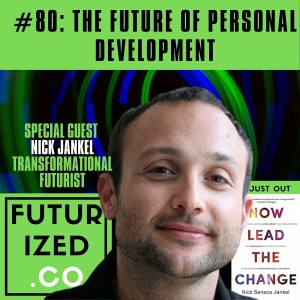
Thursday Jan 21, 2021
The Future of Personal Development
Thursday Jan 21, 2021
Thursday Jan 21, 2021
Nick Jankel, transformational futurist, the CEO and co-founder of Switch On, and author of the new book Now Lead The Change, interviewed by futurist Trond Arne Undheim.
In this conversation, they talk about The Personal Development Market. VUCA (volatility, uncertainty, complexity, and ambiguity). Trends in Self-help, Leadership, Therapy, Coaching, and Healing. Brain science. Wisdom. Practical psychology. Bio-Transformation Theory. Reading cognitive v. emotional signals in yourself and others. The future of business and human personal development, next decade and beyond. Being future-proof (as organizations and individuals).
The takeaway is that the Personal Development Market is just starting up. If you include Therapy, Coaching, Leadership, and Mindfulness apps, it may well be a 100 billion market. The idea that we should be the change we want to see in the world, a saying that has been attributed to the famous Indian leader Mahatma Gandhi, is easy to pronounce but hard to do, but may well be an essential insight. What is for certain is that we cannot sit around waiting for positive change, no matter where we are on the societal ladder. Tying it explicitly to futurist thinking was novel to me and quite refreshing.
After listening to this episode, check out Switch On, Now Lead the change--the book, as well as Nick Jankel's online profile:
- Switch On https://switchonnow.com/
- Now Lead the change https://www.amazon.com/Now-Lead-Change-Future-Proof-Transformational-ebook/dp/B085TRK243
- Nick Jankel (@nickjankel) https://www.linkedin.com/in/nickjankel/
The show is hosted by Podbean and can be found at Futurized.co. Additional context about the show, the topics, and our guests, including show notes and a full list of podcast players that syndicate the show can be found at https://trondundheim.com/podcast/. Music: Electricity by Ian Post from the album Magnetism.
For more about the host, including media coverage, books and more, see Trond Arne Undheim's personal website (https://trondundheim.com/) as well as the Yegii Insights blog (https://yegii.wpcomstaging.com/). Undheim has published two books this year, Pandemic Aftermath and Disruption Games. To advertise or become a guest on the show, contact the podcast host here.
Thanks for listening. If you liked the show, subscribe at Futurized.co or in your preferred podcast player, and rate us with five stars. If you like this topic, you may enjoy other episodes of Futurized, such as episode 51 which is on AI for Learning, episode 16 on Perception AI, episode 49 Living the Future of Work, episode 24 on The Future of The Second Half of Life, episode 32 Future proof your business, episode 33 One Woman's Empowerment Quest to help one million, episode 73 The Future of Social Learning, and episode 34 Behavioral Science in Product Design. Futurized—preparing YOU to deal with disruption.
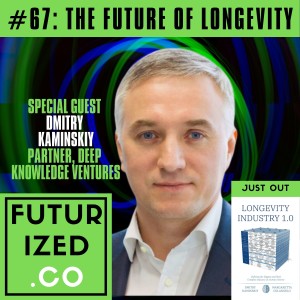
Tuesday Jan 19, 2021
The Future of Longevity
Tuesday Jan 19, 2021
Tuesday Jan 19, 2021
Dmitry Kaminskiy, Partner, Deep Knowledge Ventures, interviewed by futurist Trond Arne Undheim.
In this conversation, they talk about What is longevity and why does it matter if we live longer? Health span v. Lifespan. The Intersection of AgeTech, WealthTech and FinTech. The silver tsunami (of aging). Quality-adjusted life-year (QALY). Scenarios. Rise of policy scene for longevity. Biomarkers on the path to population health. How AI intersects with longevity. P4 (Preventive, Precision, Personalized and Participatory) Medicine. Who will first reach their 123rd birthday? A Manhattan project for longevity. The Longevity Industry 1.0 and 2.0—towards the next trillion dollar industry.
The takeaway is that longevity may indeed be the next trillion dollar industry and may perhaps be the most complex industry as well. Staying in good health is an important shared goal across the globe, and our health is constantly under threat from diseases, including aging. However, there is a drastic difference in the goals of increasing healthspan v. increasing life span. To my mind, there might even have to be a significant ethical debate whether life span is worth increasing on a general basis. Do we really need to live that much longer? Is there an optimal life span and does it depend on the available resources or the available meaning of life that the individual has at any given time? These are complex questions without obvious answers.
After listening to the episode, check out Deep Knowledge Ventures, Longevity 1.0, the book, as well as Dmitry Kaminskiy's online profile:
- Deep Knowledge Group https://www.dkv.global/
- Longevity 1.0 https://www.longevity-book.com/
- Dmitry Kaminskiy (@DmitryKaminskiy) https://www.kaminskiy.info/ and https://www.linkedin.com/in/dmitrykaminskiy/
The show is hosted by Podbean and can be found at Futurized.co. Additional context about the show, the topics, and our guests, including show notes and a full list of podcast players that syndicate the show can be found at https://trondundheim.com/podcast/. Music: Electricity by Ian Post from the album Magnetism.
For more about the host, including media coverage, books and more, see Trond Arne Undheim's personal website (https://trondundheim.com/) as well as the Yegii Insights blog (https://yegii.wpcomstaging.com/). Undheim has published two books this year, Pandemic Aftermath and Disruption Games. To advertise or become a guest on the show, contact the podcast host here.
Thanks for listening. If you liked the show, subscribe at Futurized.co or in your preferred podcast player, and rate us with five stars. If you like this topic, you may enjoy other episodes of Futurized, such as episode 55 AI for Medicine, episode 19 on Digital Health in Future Pandemics, episode 26 How to Write a book on the Future of Healthcare, episode 30 on Artificial General Intelligence, episode 35 on Augmented Reality, episode 47 on How to invest in Sci-Fi Tech, and episode 54 on the Future of AR. Futurized—preparing YOU to deal with disruption.
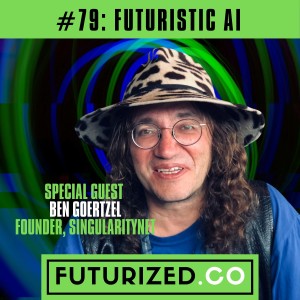
Thursday Jan 14, 2021
Futuristic AI
Thursday Jan 14, 2021
Thursday Jan 14, 2021
Ben Goertzel, CEO and founder of SingularityNET and Chairman of the Artificial General Intelligence Society, interviewed by futurist Trond Arne Undheim.
In this conversation, we talk about Futuristic applications of interoperable AI. Sophia- the robot. Singularity. Transhumanism. How to define intelligence . Decentralized, Distributed, interoperable AI. The importance of trust to progress with technology. Future of human-computer interaction.
My takeaway is that futuristic AI will continue to fascinate, whether we ever get there--or not. It is a Janus faced future the proponents of Artificial General Intelligence are exploring. Will it solve more problems than it creates? In reality, it’s not a question of when we get there --un less we suddenly find ourselves needing that level of intelligence for an existential survival issue for our race, but how we get there. At some point, we likely will. But whether it will take 50 or 150 years, I’m less sure about.
After listening to this episode, check out SingularityNET and Ben Goertzel's online profile:
- SingularityNET https://singularitynet.io/
- Ben Goertzel https://www.linkedin.com/in/bengoertzel/
The show is hosted by Podbean and can be found at Futurized.co. Additional context about the show, the topics, and our guests, including show notes and a full list of podcast players that syndicate the show can be found at https://trondundheim.com/podcast/. Music: Electricity by Ian Post from the album Magnetism.
For more about the host, including media coverage, books and more, see Trond Arne Undheim's personal website (https://trondundheim.com/) as well as the Yegii Insights blog (https://yegii.wpcomstaging.com/). Undheim has published two books this year, Pandemic Aftermath and Disruption Games. To advertise or become a guest on the show, contact the podcast host here.
Thanks for listening. If you liked the show, subscribe at Futurized.co or in your preferred podcast player, and rate us with five stars. If you like this topic, you may enjoy other episodes of Futurized, such as episode 30 on Artificial General Intelligence, episode 51 which is on the AI for Learning, episode 16 on Perception AI, episode 49 Living the Future of Work, episode 35 on How 5G+AR might revolutionize communication, episode 47 on How to Invest in Sci-Fi Tech, episode 54 on the Future of AR, and episode 31 on The Future of Commoditized Robotics. Futurized—preparing YOU to deal with disruption.
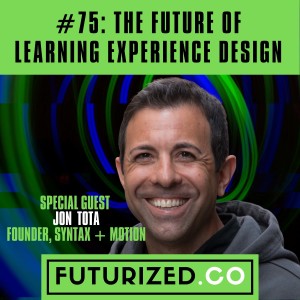
Tuesday Jan 12, 2021
The future of learning experience design
Tuesday Jan 12, 2021
Tuesday Jan 12, 2021
Jon Tota, CEO and founder of Syntax + Motion and host of the Learning Life Podcast, interviewed by futurist Trond Arne Undheim.
In this conversation, we talk about The future of learning experience design. Shifting focus from the teacher to thinking about learners first. How to teach true skills? How do you get the user to interact? From learning management systems (LMS) via design thinking to learning experience platforms (LXP). Should everybody have their own online course for personal branding? Corporate learning. Individual thought leadership. How to navigate the noise? What to consume? What to produce? How to earn money with content?
The takeaway is that learning experience design is an ever-evolving field which finally is taking off. We need it. Learning should be fun, interactive, engaging and learning software platforms should be well thought out and easy to use. It’s slowly starting to happen.
After listening to the episode, check out Syntax + Motion, the Learning Life Podcast as well as Jon Tota's online profile:
- Jon Tota (@jontota) https://thriveloud.com/thrive_loud/272-jon-tota/
- Syntax+Motion ( https://www.syntaxproduction.com/
- Learning Life podcast https://learninglifeshow.com
The show is hosted by Podbean and can be found at Futurized.co. Additional context about the show, the topics, and our guests, including show notes and a full list of podcast players that syndicate the show can be found at https://trondundheim.com/podcast/. Music: Electricity by Ian Post from the album Magnetism.
For more about the host, including media coverage, books and more, see Trond Arne Undheim's personal website (https://trondundheim.com/) as well as the Yegii Insights blog (https://yegii.wpcomstaging.com/). Undheim has published two books this year, Pandemic Aftermath and Disruption Games. To advertise or become a guest on the show, contact the podcast host here.
Thanks for listening. If you liked the show, subscribe at Futurized.co or in your preferred podcast player, and rate us with five stars. If you like this topic, you may enjoy other episodes of Futurized, such as episode 73 on The Future is Social Learning, episode 65 which is on The Urgency of a Social-Emotional Learning Fix, or episode 51 which is on AI for Learning, episode 27 on the Future of Online Learning, episode 28 on The Future of K-12 Education, or episode 22 on the Future of Engineering Education. Futurized—preparing YOU to deal with disruption.
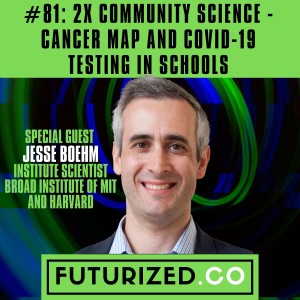
Monday Jan 11, 2021
2x Community Science -- Cancer Map and COVID-19 Testing in Schools
Monday Jan 11, 2021
Monday Jan 11, 2021
Jesse Boehm, the scientific director of the Broad Institute’s Cancer Dependency Map Initiative and an institute scientist at the Broad Institute of MIT and Harvard, interviewed by futurist Trond Arne Undheim.
In this conversation, they talk about mobilizing the unique sci-tech environment for health in Massachusetts. They discuss the Broad Institute's ethos and the Boehm Lab’s cancer collaboration for rare diseases. They cover the Healthtech Map, Test & Trace efforts including a 3-month pilot program of weekly COVID testing for certain students and staff. and how it got off the ground. We look at Wellesley Education Foundation (WEF) COVID-19 Innovation Fund and what is has accomplished. Finally, we discuss the future of healthtech and the future of community scientists and ‘community resource maps’, towards Science 2.0.
The takeaway is that community science is crucial at this juncture in history. We can no longer take for granted that people listen to experts, nor should we. Rather, it needs to be a dialogue. Trust is and should be contingent on proving value and disclosing evidence and rationale. Also, the data is increasingly all of us, so we are the science. This is a very different future than many had imagined. Yet, it might be the only one available.
After listening to this episode, check out Jesse Boehm's online profile, the Broad Institute’s Cancer Dependency Map Initiative and The Wellesley Education Foundation (WEF) COVID-19 Innovation Fund:
- Broad Institute’s Cancer Dependency Map Initiative https://www.broadinstitute.org/cancer/cancer-dependency-map
- Boehm Lab http://www.boehmlab.org/
- Jesse Boehm (@boehmjesse) https://www.linkedin.com/in/jesse-boehm-0881145/
- The Wellesley Education Foundation (WEF) COVID-19 Innovation Fund https://www.wellesleyeducationfoundation.org/innovation-fund
Thanks for listening. If you liked the show, subscribe at Futurized.co or in your preferred podcast player, and rate us with five stars. If you like this topic, you may enjoy other episodes of Futurized, such as episode 55 AI for Medicine, episode 19 on Digital Health in Future Pandemics, episode 26 How to Write a book on the Future of Healthcare, and episode 67 on The Future of Longevity Futurized—preparing YOU to deal with disruption.

Thursday Jan 07, 2021
The Future of Quantum Security
Thursday Jan 07, 2021
Thursday Jan 07, 2021
Jaya Baloo, Chief Information Security Officer (CISO), Avast Software, interviewed by futurist Trond Arne Undheim.
In this conversation, they talk about why is it so hard to eradicate cybersecurity challenges? Internet Organised Crime Threat Assessment (IOCTA). Threats we are ready for and know about vs. Threats we don’t know about are not ready for. The Quantum Market Players, Challenges, and applications. What quantum security challenges do you worry about in the next decade? Jaya uses the story of Alice, Bob, and ex-girlfriend Eve to illustrate quantum security. How to teach quantum computing to a new gen of engineers.
The takeaway is that quantum security is just around the corner--because if it isn’t, we are all in trouble. Quantum computing has gone from being a theoretical possibility, to a highly experimental, niche application among a few computer firms, to a significant, emerging government concern, and a future business opportunity for those with a lot of data to crunch fast. Most of us don’t need to worry about it in this decade, but doing so, is a bit like not thinking about retirement in your twenties. It isn’t necessary, but it is smart to do.
After listening to the episode, check out Avast Software as well as Jaya Baloo's online profile:
- Avast Software https://www.avast.com/en-us/index#pc
- Jaya Baloo (@jayabaloo} https://www.linkedin.com/in/jaya-baloo-558492/
The show is hosted by Podbean and can be found at Futurized.co. Additional context about the show, the topics, and our guests, including show notes and a full list of podcast players that syndicate the show can be found at https://trondundheim.com/podcast/. Music: Electricity by Ian Post from the album Magnetism.
For more about the host, including media coverage, books and more, see Trond Arne Undheim's personal website (https://trondundheim.com/) as well as the Yegii Insights blog (https://yegii.wpcomstaging.com/). Undheim has published two books this year, Pandemic Aftermath and Disruption Games. To advertise or become a guest on the show, contact the podcast host here.
Thanks for listening. If you liked the show, subscribe at Futurized.co or in your preferred podcast player, and rate us with five stars. If you like this topic, you may enjoy other episodes of Futurized, such as episode 13 Cybersecurity: Review of the RSA Asia Pacific & Japan (APJ) 2020 Virtual Event, episode 30 on Artificial General Intelligence, episode 51 which is on the AI for Learning, episode 16 on Perception AI, episode 49 Living the Future of Work, episode 35 on How 5G+AR might revolutionize communication, episode 47 on How to Invest in Sci-Fi Tech, episode 54 on the Future of AR, and episode 31 on The Future of Commoditized Robotics. Futurized—preparing YOU to deal with disruption.

Tuesday Jan 05, 2021
Industrial-grade Mixed Reality
Tuesday Jan 05, 2021
Tuesday Jan 05, 2021
Urho Konttori, co-founder and Chief Innovation Officer of Varjo, the mixed reality equipment maker, interviewed by futurist Trond Arne Undheim.
In this conversation, they talk about The Future of Industrial-grade Mixed Reality (MR). The advent of enterprise/industrial-grade AR/VR/XR/MR/hybrid reality and its impact on RR. Which companies are using it already? Current professional user types. Emerging use cases. Why is Varjo so focused on human-eye resolution devices and hi-res MR? We discuss adoption timelines and formfactors as well as remaining technical/market challenges. We look into the Future of mixed reality (5-10 years ahead).
The takeaway is that industrial mixed reality has now come of age. It is only a question of few years, until large swaths of industry and a plethora of professionals will depend on it to do their job. The pandemic could not have come at a bigger inflection point for the industry.
After listening to this episode, check out Varjo as well as Urho Konttori's online profile:
- Varjo https://varjo.com/
- Urho Konttori (@konttori) https://www.linkedin.com/in/urho-konttori-aa16835/
The show is hosted by Podbean and can be found at Futurized.co. Additional context about the show, the topics, and our guests, including show notes and a full list of podcast players that syndicate the show can be found at https://trondundheim.com/podcast/. Music: Electricity by Ian Post from the album Magnetism.
For more about the host, including media coverage, books and more, see Trond Arne Undheim's personal website (https://trondundheim.com/) as well as the Yegii Insights blog (https://yegii.wpcomstaging.com/). Undheim has published two books this year, Pandemic Aftermath and Disruption Games. To advertise or become a guest on the show, contact the podcast host here.
Thanks for listening. If you liked the show, subscribe at Futurized.co or in your preferred podcast player, and rate us with five stars. If you like this topic, you may enjoy other episodes of Futurized, such as episode 30 on Artificial General Intelligence, episode 51 which is on the AI for Learning, episode 16 on Perception AI, episode 49 Living the Future of Work, episode 35 on How 5G+AR might revolutionize communication, episode 47 on How to Invest in Sci-Fi Tech, episode 54 on the Future of AR, and episode 31 on The Future of Commoditized Robotics. Futurized—preparing YOU to deal with disruption.
